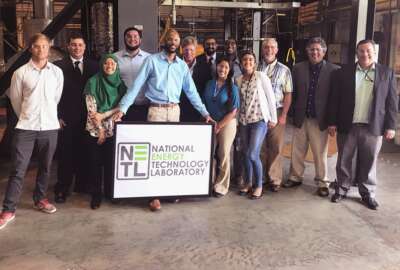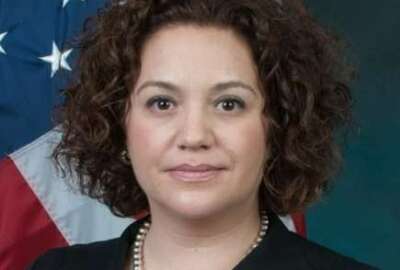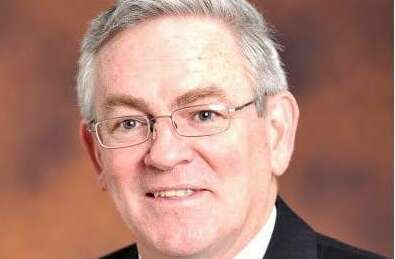
NNSA to host virtual job fair
The National Nuclear Security Administration, which has had success with in-person job hiring fairs, is going virtual.
Best listening experience is on Chrome, Firefox or Safari. Subscribe to Federal Drive’s daily audio interviews on Apple Podcasts or PodcastOne.
The National Nuclear Security Administration, which has had success with in-person job hiring fairs, is going virtual. It will hold an online fair Wednesday for some one hundred positions across the country. With details, NNSA’s associate administrator for management Frank Lowery joined Federal Drive with Tom Temin.
Interview transcript:
Tom Temin: Mr. Lowery, good to have you back.
Frank Lowery: Hey Tom. Thanks for having me back. I appreciate it.
Tom Temin: First of all, tell us what it is that you are hiring for, seems like this agency has a pretty steady need for talent.
Frank Lowery: Thanks, Tom. We do. It’s an exciting mission. So the National Nuclear Security Administration, when you hear about us, you think about both our strategic nuclear deterrence, and you think about nuclear non proliferation, and you think about naval reactors, reactor plants tat keep our aircraft carriers and submarines operating all around the world. And so we have an incredibly important mission to our nation’s security, and we have a changing over of the guard were folks who have been with us for four decades, they’re getting ready to move on to their next thing in life — and we’re looking to bring in fresh new talent to carry on this mission for us for the decades to come. So you’re exactly right — we are we are hiring. And the last couple times you and I spoke, we were getting ready to do our job fair over in Crystal City. That was the one that was in person where folks came in to a nice hotel ballroom where we had booths and kiosks set up. And the folks that came in for the day, for the job fair day, could talk to actual hiring managers on the site, and they frequently walked out of the ballroom with a job offer in hand. So with the COVID-19 environment kind of changing our strategy here a little bit, folks aren’t too excited about walking into a big ballroom jammed with other people. But we still have hiring needs and we’re looking to bring onboard roughly 100 people a little over 100 people between now and the end of of the year. And so, to specifically answer your question, we’re hiring across all all disciplines. We’re hiring engineers. We’re hiring physical scientists. We’re hiring operations, research analysts. We’re hiring Public Affairs Specialist. So you might have some friends you’d be able up tho put onto us. And we’re hiring security specialists. So if you’re out there looking for an exciting mission, and in a stable, this is a very stable work, we have important, incredibly important work that is nowhere near a sunset here. We’re trying to make sure our country is safe and secure. Come on down to the virtual job fair and we’ll have a room set up on the virtual job fair, where you can hop in and converse electronically with one of our hiring managers and or our HR specialists, and or folks like me who just want to introduce you to the National Nuclear Security Administration and let you know more about what it is we do.
Tom Temin: Tell us more about the rooms. Do they go by location? Cause you have numerous locations across the country where you’re looking for people. But also various types of occupations. So are the rooms divided by location or occupation? Or how does that work?
Frank Lowery: When you log on to the system — in fact if you go to our NNSA website, the one that’s right up on the internet, and you’ll see a link on the website, you can click the link, it takes you to the article describing this virtual job fair. Inside that article, it gives you the link where you can register, registration is free. It costs nothing. And when you register, it’s going to give you some options to select telling us things that you are interested in. So for example, on locations that you might be interested in, you might want to work in Washington DC, great we got we got jobs there. You might want to work in Albuquerque, New Mexico. We got jobs there too. We got jobs at the Savannah River down in South Carolina. We got jobs in Kansas City. We got jobs in Livermore, California. We got jobs in Amarillo, Texas. We got jobs in Oak Ridge, Tennessee. We got jobs pretty much if look from the map of the United States, we’ve got them from right to left, we can we can get you close to where you’re trying to go. And it’s all described in the in the website. When you click on the registration on the website, it’s going to ask you what areas you’re interested in. So that’s one part of the answer. Geography matters to a lot of folks and so they can let us know what geography they’re most interested in. Second, folks are interested in what type of work are we talking about. And so we can we can knock down the geography question right out of the gate. And then second, the type of work that we’re looking to hire for. And that goes back to my primary answer about your physical scientist or a general engineer, or a public affairs specialist, or an operations research analyst. Those job types are described, and by going into one of those virtual rooms, you get to engage with a hiring manager that’s looking to hire that discipline. And the hiring manager that you’re talking with is the person who’s in the geography area that you’re most keen on. And so right away, theis virtual job fair allows you to cut through I think very quickly and efficiently instead of being in the human ballroom like we were last two times we did the job fairs over in Crystal City. This instance, you can use your mouse on your computer and click once click twice, click three times and be talking to, electronically, virtually, talking to the manager that does the type work you’ve seen most interested in. And if you get that not right, you end up in a booth or a room where it’s not really what you thought it was, that person is going to help you get out of that room and get over to the one you want because they’re interested in making sure that you’re satisfied with your experience — and so their job that day virtual job today is to help you get into the correct room where we can answer your questions and hopefully, get you on the team. Tom, does that help?
Tom Temin: Alright, and what do people need to bring with them? Is there a way to upload resumes and other materials that the NNSA might need?
Frank Lowery: As a virtual job fair — I did it myself, I went into the link clicked on the link, started a profile, asks for my name, it asks for my email address, it asks for a cell phone contact number, all straight forward stuff, no privacy stuff in there. there’s no social security numbers required, none of that kind of thing. But at the end of that registration, it also gives me an opportunity to upload my resume. And so I recommend that, and so that’s to answer your first your first part of your question is, what do I need to bring? Hey, folks, when you log on and start your work profile in a virtual chapter, if you don’t have your resume ready, that’s okay. Go ahead and start your profile. And then you can log off, work on your resume and log back on and upload your resume when you’re ready. Plus, if you use some of the systems and social media systems like LinkedIn, it gives you an opportunity to cut and paste your LinkedIn profile there which many folks put resumes right in there with their LinkedIn profile. And that might save you some time and get you in there more efficiently. And again, this is a virtual job fair so you don’t have to bring anything to affair you can do this from your house, in your in your jammies. With the COVID-19, we’re trying to spare everybody the trouble of having to go, you know, maneuver through the metro and that sort of thing. Just log on to your computer and hop into one of our rooms and we’ll help you get to the next step.
Tom Temin: Let me just ask a question about the industry. If someone is applying there, and they have worked, say in one of the large commercial operations that might support aircraft carriers with their nuclear power plants or submarines, or whatever the case might be or commercial plants, is it possible that people in the industry know one another so that some of the people looking for hires might already be familiar with the people applying just from having contact with them in a relatively small industry?
Frank Lowery: The answer’s yes. That’s a small community in our nation and internationally. The job title or job niche of nuclear security is a small community. Odds are, you may find somebody in the virtual job fair booth, one of those hiring managers might be somebody that you’ve worked with before. It could be a colleague from your time in the in the armed forces, it could be a colleague from your time in commercial nuclear power industry, it could be a colleague, from your time working for the Nuclear Regulatory Commission. It could be a colleague from your prior experience with the State Department, because we do an awful lot of work with international partners on that defense nuclear non proliferation mission where we work hard to make the whole world safer. And so odds are, for example, in my case, when I came to work at the National Nuclear Security Administration, I was probably for the first five or six weeks that I was here. It wasn’t a day went by that I didn’t see some old colleagues that maybe I hadn’t seen in a few decades, but it was always good to reconnect with folks that you’ve worked with before. And I think we’re gonna have a lot of positive energy about that in this virtual job fair, Tom.
Tom Temin: And can people leave the fair with a tentative offer? I guess at some point you have to contact people in person for finalization though?
Frank Lowery: Well, Tom, here’s what we figured out how to do with with the pandemic going on. Everything that we used to do in person, for example of interviews, the hiring manager used to do in person face to face interview — not needed. We can do that with like a Skype setup or a Zoom setup or WebEx setup. We do those interviews virtually and there’s no face to face physical contact required. Drug tests, drug testing when we did our job fairs in Crystal City that was kind of unique for all the federal government. We did our drug testing that day on site and folks who completed their job interview and their drug tests walked out the front door of that hotel with a job offer in hand. We figured out how to do it during COVID-19 where we can delay that drug test for a period of time after the person’s onboard and working for us, and it has some impact on all of the things that they can do for us, we have to have some limitations until we get that drug test done, but it’s not going to delay our hiring the person, get them on the payroll, getting the benefits started, and getting them on the team so they can learn more about what it is we do and how we do it. The same thing goes for physical things like fingerprints, you just have to do that in person. These are things that are required for a security clearance to be processed, but we have figured out during this covert pandemic, how to delay some of those mechanical, physical things. Get the hiring done, get the person on board, get their pay started and get the benefits started. — and then we catch up with all those other mechanical things weeks down the road once the environment is more stable and able to support that
Tom Temin: Frank Lowery is Associate Administrator for management and budget at the National Nuclear Security Administration. Thanks so much for joining me and good luck on that fair Wednesday.
Frank Lowery: Hey, Tom, thanks for having me. And y’all come on down on the 24th of June to the NNSA virtual job fair — we’ll have some fun out there.
Check out the NNSA virtual job fair here.
Copyright © 2025 Federal News Network. All rights reserved. This website is not intended for users located within the European Economic Area.
Tom Temin is host of the Federal Drive and has been providing insight on federal technology and management issues for more than 30 years.
Follow @tteminWFED





